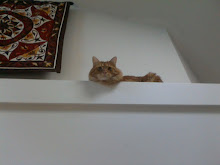It took longer than Paul expected to
find the evidence he sought. It consisted of a sheet of aged paper
pinned to a battered square of cork, located on the wall next the
study door. From other notes pinned there Paul surmised it to be a
means by which the late Professor Knappenburger communicated with his
servant. He unpinned the note and examined it. The obverse had a note
concerning laundry. The reverse... Paul smiled with satisfaction.
Amid many a crossing out and blot he made out the following.
My Dear
Grafin,
With
reference to your inquiry as to the validity of a marriage between
your cousin Graf Philip von Hetzenberg and a woman of common birth,
to whit, one Mary Amadeus.
I’m
pleased to inform you it is entirely permissible under our law for a
member of the Grand Ducal family to unite with a commoner in a
Morganatic marriage. Laws on the statute books governing Ducal
marriages dating back over two hundred years clearly permit such a
formal union. Our forebears in their wisdom saw matters of
interbreeding and too concentrated a nature of the Ducal
relationships to be clearly unfavorable to the bloodline as a whole.
Provision was therefore made to allow fresh blood to be introduced to
the family line, although the law has not been indulged in for some
decades.
I
trust this clarifies the matter and eases any concerns you might feel
regarding your friend’s situation.
I
remain, Grafin, your humble, obedient servant, I. Knappenburger.
There
was no mistaking the Professor’s writing. Paul
rolled up the note and tapped it against his palm as he considered
the situation. The
estimable Bartolomeo Gundaker is fallible, it seems. In his haste to
perpetrate his commission he overlooked a draft copy of the very
letter he sought to corrupt. He
smiled. What makes it
all the sweeter, the note was on the back of a missive intended for
him!
He
tucked the note in his innermost pocket and headed out the door. A
brief conference with the Chancellor left that worthy satisfied the
professor’s affairs would be taken care of.
That
evening
saw Paul aboard the coach bound for the
Grand Duchy of Hetzenberg.
He looked out the window as the vehicle rattled along the highway,
and thought of the approbation Ursula would heap upon him for his
success in helping her friend. It gave him a warm glow about the heart
to think of the radiant smile that would cross her beautiful face.
* * * *
The
hull of Styx II
vibrated gently
with
the steady flow
of water
against her hull
as the flotilla rode
at anchor
in the gathering night.
Beyond the little stateroom’s windows the Eissenwasser flowed dark,
strong
and steady to the sea, with no concern for the affairs of mankind
embattled
about its banks.
Ursula
laid upon Horatio, her arms folded loosely on his bare chest, her
feet pressing against the cool wood of the aft bulkhead, so small was
the cot in which they laid. She felt sated and happy but, as intense
and fulfilling as their lovemaking had been, one question still
floated near the top of her mind. “You’re sure we’ll reach the
vicinity of Randstadt by tomorrow evening?”
“Yes,
beautiful.” Horatio stroked Ursula’s cheek and tucked a stray
length of damp
hair
behind her ear. “We're but a league above Kimmelsbrück. The
river’s quieter now the snow melt has passed. The wind stands fair,
and looks to be coming farther north yet tomorrow.”
“I
hope so. I'm worried about Mary A. Paul will try his best, no doubt, but at the moment only I
can intercede on her behalf so she can marry Philip.”
“We’ll
get there, and we will help her. Don’t worry so!”
“You’re
right,
my love,” she whispered, kissing
him deeply. He
returned her kiss then yawned and stretched, awkwardly favoring his
wounded arm. Ursula rolled off him and he moved aside enough for her
to squeeze in beside him. “Get some sleep, hero,” she admonished.
“You had a long day.”
“Just
so, my dear.” He put his arm around her and she nestled close, her
head upon his shoulder. His voice sounded drowsy. “We’ll get
there.”
Ursula
listened to the steady beat of his heart beneath her ear, felt the
rise and fall of his chest slow as his breathing settled into sleep.
She looked up through the stern-lights and watched the night deepen
to starry indigo, and wondered what Mary Amadeus was doing, and how
they would all fare on the morrow. Eventually, she fell asleep.
* * * *
Several
leagues away Mary Amadeus laid in her camp cot, staring up at the
canvas above her head. A camp fire nearby cast shadows there that
seemed to morph into strange and terrible things. She could hear the
sentry on guard outside the fly of her tent, placed there by the
general. “I have no recourse but to inquire into this matter, my
dear,” he’d said with evident reluctance. “I cannot believe you
and Philip would be so foolish as to correspond in this way, but I am
bound by duty to treat the matter with the utmost seriousness.”
And
so she had been confined her to quarters pending the outcome. She
thought of the siege and the plan she’d made which would end it all
before many more lives were spent. And
now due to someone’s malice here I am, in peril of my life and
utterly useless. I wish Philip were here, and Ursula and Horatio! She
turned over, punched the pillow into some form of comfort and tried
to sleep, but her thoughts whirled on deep into the night.





